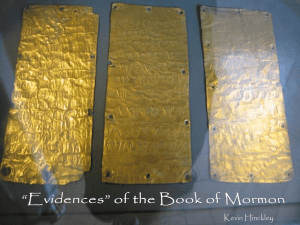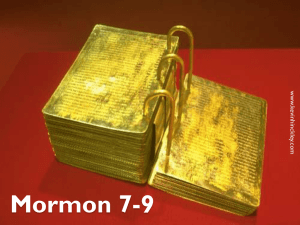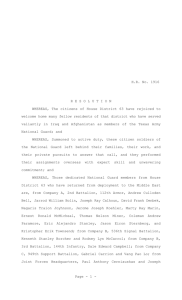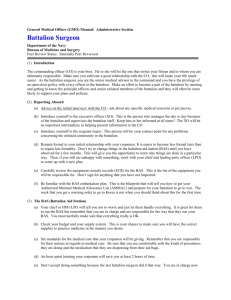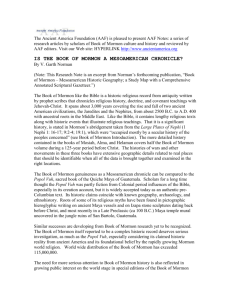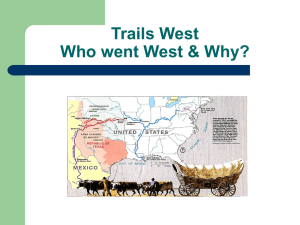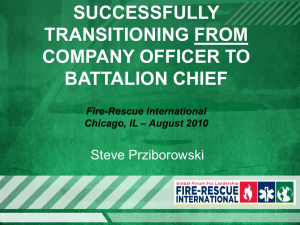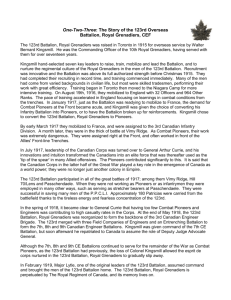powerpoint
advertisement
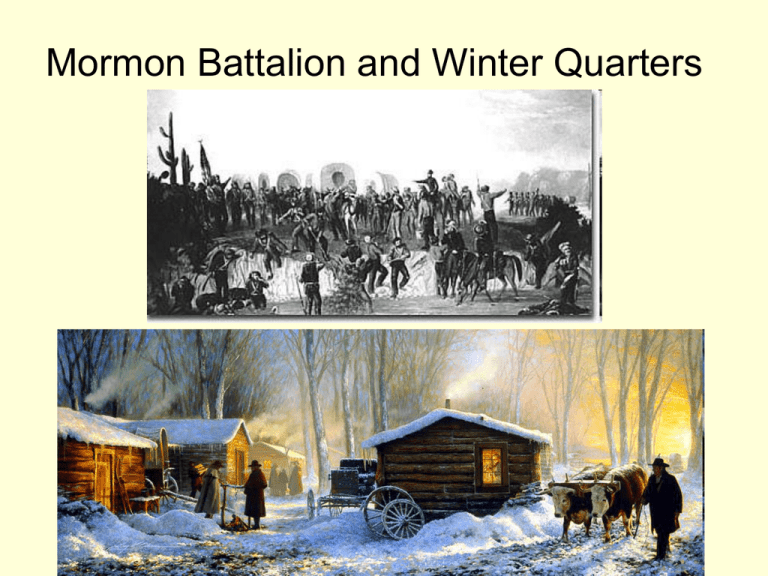
Mormon Battalion and Winter Quarters • • • • Mormon Battalion Battalion- 200-500 soldiers Camped in Iowa and asked to join US fighting war with Mexico 500 men joined, 34 women as laundresses, and children • Mormons being persecuted, so why would they help? • Leader Brigham Young said they needed to do it as their patriotic duty • Without his counsel there may not have been a Mormon Battalion Historian, Sherman L. Fleek • The common reasons that other men joined the army— individual or collective patriotism, adventure, boredom, or avoiding the law—did not apply to the Mormon men who enlisted because of the directives and desires of their ecclesiastical leader, Brigham Young. There is no doubt that without Brigham Young’s acceptance of the offer to form the battalion, there would have been no Mormon Battalion. The men enlisted as a religious duty rather than as a call to arms, and their service was linked to the promise that if they enlisted to support and help fund the Mormon trek across the plains, the church in turn would support their families. Some of the salaries and allowances that these soldiers earned were donated to representatives for church use. No other American military unit has been formed to forward the cause of a religious group. Religion was central to the men, and it shaped the battalion in many ways. (History May Be Searched in Vain: A Military History of the Mormon Battalion) Counsel from Brigham Young to Mormon Battalion • I instructed the captains to be fathers to their companies, and manage their affairs by the power and influence of their priesthood, then they would have power to preserve their lives and the lives of their companies and escape difficulties. I told them I would not be afraid to pledge my right hand that every man will return alive, if they will perform their duties faithfully, without murmuring, and go in the name of the Lord…keep neat and clean, teach chastity, gentility, and civility; swearing must not be admitted, insult no man; have no contentious conversation with any [type] of people…Should the battalion engage with the enemy and be successful, treat prisoners with the greatest civility, and never take life, if it can be avoided. (in Daniel S. Tyler, Concise History of the Mormon Battalion, Salt Lake City, 1881, pg. 128-129). • Marched from Council Bluffs, Iowa to San Diego, California • 2,000 miles—one of the longest infantry marches! • Only religious unit in military history • How would it be to march through the desert in the July heat? Mormon Battalion • Ate hard tac • Sang daily “The Girl I Left Behind Me” (https://www.youtube.com/watch?v=61xLSoAd8 6c) • Most used the flintlock 1816 model gun (weighted 9 lbs. 5 ft long and 16-18 in bayonets!) • Only “battle” with the buffalo stampede • 3 men injured, several dozen buffalo killed (used as food) Effects of the Mormon Battalion • First wagons to cross this route • Blazed the trail for the gold seekers going to California • Helped westward expansion • Some went back to Utah, some went back to Iowa, and some stayed in California Winter Quarters Cemetery The Winter Quarters experience was difficult. Many of the men had been taken to join the Mormon Battalion and the living conditions were very poor. The remaining men had a staggering responsibility to ensure that everyone had enough food and supplies to sustain the struggling group of Saints. Over 600 people died here and many of them are buried in the pioneer cemetery.2 In all, more than 3,400 people lived here and the Saints were able to establish a community until they left for Salt Lake. Winter Quarters was essentially abandoned in 1848. Those who did not go west immediately, traveled back across the river to Kanesville which became the launching place for emigrants going to the Salt Lake Valley. Pioneer Story AMY SUMNER PORTER: “The trek across Iowa was difficult as the wagons sloshed through rain and sleet, mired in mud and muck. The trip was particularly hard on me, for I was pregnant once again. This pregnancy seemed more uncomfortable than all the other, and I yearned to be living in a home instead of a wagon. Finally it was decided by the brethren that we could not make all the way west that season. The Saints were tired, and too weak, and the provisions were low. So we stopped for the winter on the border of Iowa and Nebraska. We named the place Winter Quarters. On December 11, I discovered the cause of my special discomfort, when two little darling baby boys were born twins which we named Joseph and Benjamin. They came early, and were thus unprepared for the harsh, cold of a snowy winter in a thin cloth tent which gave free access to piercing winds. They quietly left this earth and my loving arms the next day, December 12. It seems the cold bitter weather will never stop. I am weary and worn. My helath has deteriorated to where I can not move an inch. My dear husband takes me in his arms and hold me until my bed is made nearly every day. But now he, too, is sick with the scurvy. Oh, how shall we ever go on?! My little children gather around me, but I feel a loss to help them, for I can not move myself in bed neither speak out loud. They surely must know of my love for them, and my hopes for their future. If I cannot make it too the land of Zion, I am confident that the Lord will answer this prayer of my heart… that my children will remain faithful, and that through them will come generations of righteousness.

